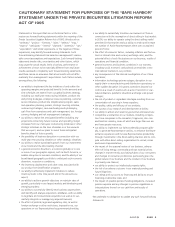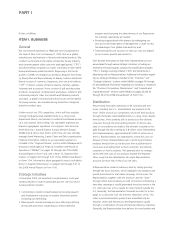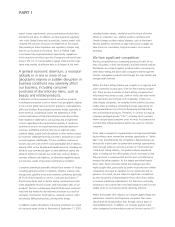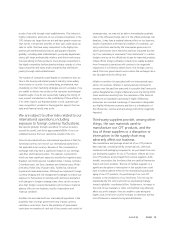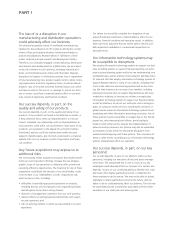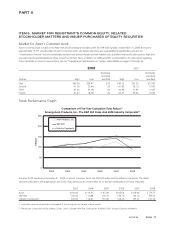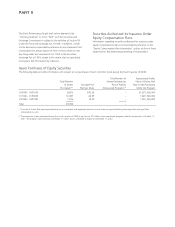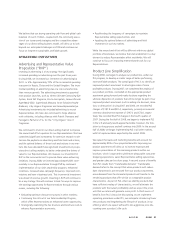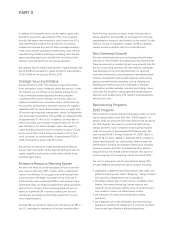Avon 2008 Annual Report Download - page 18
Download and view the complete annual report
Please find page 18 of the 2008 Avon annual report below. You can navigate through the pages in the report by either clicking on the pages listed below, or by using the keyword search tool below to find specific information within the annual report.PART I
export license requirements, privacy and data protection laws,
and tariffs and taxes. In addition, we face legal and regulatory
risks in the United States and, in particular, cannot predict with
certainty the outcome of various contingencies or the impact
that pending or future legislative and regulatory changes may
have on our business in the future. The U.S. Federal Trade
Commission has proposed business opportunity regulations
which may have an effect upon the Company’s method of oper-
ating in the U.S. It is not possible to gauge what any final regu-
lation may provide, its effective date or its impact at this time.
A general economic downturn, a recession
globally or in one or more of our
geographic regions or sudden disruption in
business conditions may adversely affect
our business, including consumer
purchases of discretionary items, such as
beauty and related products.
A downturn in the economies in which we sell our products,
including any recession in one or more of our geographic regions,
or the current global macro-economic pressures, could adversely
affect our business. Recent global economic events, especially in
North America, including job losses, the tightening of credit
markets and failures of financial institutions and other entities,
have resulted in challenges to our business and a heightened
concern regarding further deterioration globally. If conditions
continue or worsen, we could experience potential declines in
revenues, profitability and cash flow due to reduced orders,
payment delays, supply chain disruptions or other factors caused
by economic challenges faced by customers, prospective custom-
ers and suppliers. Additionally, if these conditions continue or
worsen, any one or all of them could potentially have a material
adverse effect on our liquidity and capital resources, including our
ability to issue commercial paper or raise additional capital, the
ability of lenders to maintain our credit lines, and our ability to
maintain offshore cash balances, or otherwise negatively impact
our business, results of operations and financial condition.
Consumer spending is generally affected by a number of factors,
including general economic conditions, inflation, interest rates,
energy costs, gasoline prices and consumer confidence generally,
all of which are beyond our control. Consumer purchases of
discretionary items tend to decline during recessionary periods,
when disposable income is lower, and may impact sales of our
products. We face a challenging fiscal 2009 because customers
may have less money for discretionary purchases as a result of
job losses, foreclosures, bankruptcies, reduced access to credit
and sharply falling home prices, among other things.
In addition, sudden disruptions in business conditions as a result
of a terrorist attack similar to the events of September 11, 2001,
including further attacks, retaliation and the threat of further
attacks or retaliation, war, adverse weather conditions and
climate changes or other natural disasters, such as Hurricane
Katrina, pandemic situations or large scale power outages can
have a short or, sometimes, long-term impact on consumer
spending.
We face significant competition.
We face competition from competing products in each of our
lines of business, in both the domestic and international markets.
Worldwide, we compete against products sold to consumers by
other direct-selling and direct-sales companies and through the
Internet, and against products sold through the mass market and
prestige retail channels.
Within the direct selling channel, we compete on a regional, and
often country-by-country basis, with our direct-selling competi-
tors. There are also a number of direct-selling companies that
sell product lines similar to ours, some of which also have world-
wide operations and compete with us globally. Unlike most
other beauty companies, we compete within a distinct business
model where providing a compelling earnings opportunity for
our Representatives is as critical as developing and marketing
new and innovative products. Therefore, in contrast to a typical
consumer packaged goods (“CPG”) company which operates
within a broad-based consumer pool, we must first compete for
a limited pool of Representatives before we reach the ultimate
consumer.
Direct sellers compete for representative or entrepreneurial talent
by providing a more competitive earnings opportunity or “better
deal” than that offered by the competition. Representatives are
attracted to a direct seller by competitive earnings opportunities,
often through what are commonly known as “field incentives”
in the direct selling industry. Competitors devote substantial
effort to finding out the effectiveness of such incentives so that
they can invest in incentives that are the most cost effective or
produce the better payback. As the largest and oldest beauty
direct seller, Avon’s business model and strategies are often
highly sought after, particularly by smaller local and more nimble
competitors who seek to capitalize on our investment and ex-
perience. As a result, we are subject to significant competition
for the recruitment of Representatives from other direct selling
or network marketing organizations. It is therefore continually
necessary to recruit and retain new Representatives and if we are
unable to do so our business will be adversely affected.
Within the broader CPG industry, we compete against large and
well-known cosmetics and fragrances companies that manu-
facture and sell broad product lines through various types of
retail establishments. In addition, we compete against many
other companies that manufacture and sell in more narrow CFT





